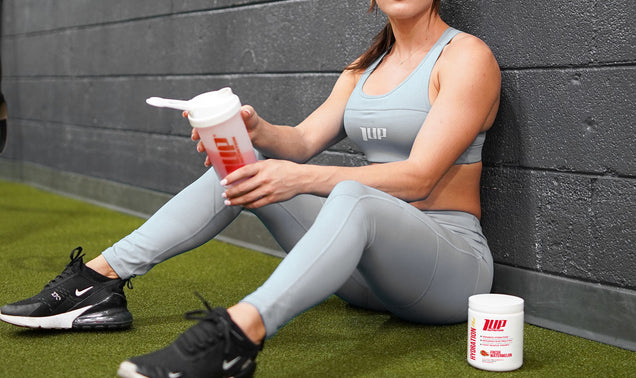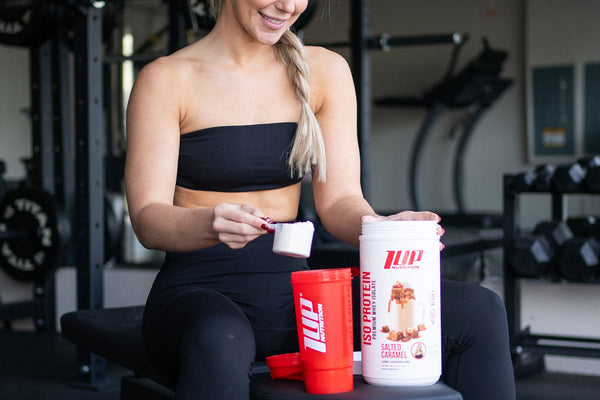Hunger and cravings are two of the main reasons individuals struggle to lose weight. To help you reach your goals, here are 7 research-backed ways to suppress appetite.
#1 Consume Enough Protein
Protein is well-known for its muscle-building and recovery benefits -- it also can help individuals trying to keep hunger in check, too! You might be surprised to find this out, but protein is the most satiating macronutrient[1], which means eating a diet that’s higher in protein can help you feel fuller in between meals compared to a diet that’s higher in carbs or fats.
Replacing some of the more carb- or fat-heavy foods in your diet with ones that are rich in protein can help to suppress appetite and keep hunger in check. One way to do this is to build all of your meals and snacks around a protein base.
For instance, at lunch start with 4-5 ounces of chicken, then add your favorite veggies, fruits, whole grains, and healthy fats to it, such as a grilled chicken salad with olive oil & vinegar dressing, mixed greens, dried cranberries, and chopped pecans.
If you find that you’re struggling to consume enough protein each day, then it may also be helpful to have a scoop of protein powder, such as Clear Protein, ISO Whey, 1UP Whey Protein, or Vegan protein.
#2 Have a Glass of Water Before Meals
Staying properly hydrated is an important part of health, performance, and feeling naturally energized. It may also help prevent you from overeating.
Research demonstrates that consuming a big glass of water prior to mealtime can help reduce calorie intake, increase feelings of fullness after eating, and promote weight loss.[2]
Drinking a big glass of water also helps to physically stretch the stomach, which sends its own fullness signal to the brain.[3]
If you’re not a fan of plain water, then try adding a few slices of fresh fruit to your water, pop open some sparkling water, or add a ½-1 serving of 1UP Hydration Plus to your water bottle. In addition to helping you drink enough water, Hydration Plus also supplies key electrolytes, essential amino acids (including 5g BCAAs), and joint support agents like type II collagen and hyaluronic acid.
#3 Include Fiber at Every Meal
Fiber is the indigestible part of plant foods. While our bodies can’t digest fiber, our gut bacteria depend on it for survival, and fiber also helps to suppress appetite. It does this by helping to slow the rate of digestion, stretches the stomach, and promotes the release of satiety hormones.[4]
A systematic review found that increasing the amount of fiber-rich foods in the diet can improve feelings of fullness by 31%.[5] Other research notes that consuming an extra 14 grams of fiber each day may reduce calorie intake by up to 10%.[6]
Highly processed foods (chips, cookies, packaged goods, etc.) are typically stripped of their fiber (and other beneficial micronutrients) during the manufacturing process, which can leave you feeling hungry after eating certain high-calorie snack foods (granola bars, energy bars, etc.).
Some healthy high-fiber foods to include in your daily meal plan are:
- Whole grains
- Nuts
- Seeds
- Legumes
- Fruit
- Veggies
It may also be helpful to include a daily fiber supplement for those occasions when you’re on the go and can’t stick to your normal high-fiber diet. 1UP Fiber Plus supplies seven grams of natural fiber from high-quality sources like golden flaxseed and psyllium husk. It can be added to your daily protein shake, electrolyte supplement, BCAA drink, or taken on its own to support gut health and keep hunger in check.
#4 Stay Active
Boredom is another sneaky culprit of snacking, which contributes to overeating. Staying busy/active is a great way to burn some extra calories and distract your mind from the thought of eating. What’s more, studies show that exercise (both cardio and resistance training) can help suppress appetite.[7,8]
Now, don’t take this to mean that you have to spend your days on the treadmill or elliptical all, but it does help to stay more active than sedentary.
If hunger strikes, and it’s still a while before your next meal, go for a 10–20-minute walk. This will help distract your mind, quell hunger, and boost metabolism!
#5 Be Mindful
Your brain is a powerful entity -- one that experiences, interprets, dictates, and regulates your daily experiences…including your appetite. Being present and intentional (“mindful”) when you eat (and what you choose to eat) plays a tremendous role in how much you eat.
Research also finds that individuals who practice mindfulness tend to consume fewer calories than those who mindlessly munch. This is one reason why it’s good to not eat while watching TV, which contributes to overeating.
#6 Add Ginger to Meals/Beverages
Ginger is a staple spice of Asian cuisine that adds brightness, bite, and dimension to all sorts of foods and beverages. It also has a long history of use as a digestive tonic, and it may also help support joint health and suppress appetite.
Interestingly studies show that adding a small amount of ginger may help to reduce appetite and increase fullness.[9]
#7 Consider Supplements
In addition to a healthy diet and exercise, certain supplements have been shown to help individuals reduce calorie intake, suppress appetite, and support their weight loss goals. We’ve done the research, in-house testing, and taken the guesswork (and expense) out of finding the best natural appetite suppressant.
1UP Appetite Suppressant is the culmination of natural appetite and weight loss support. Every serving contains research-backed ingredients, including Glucomannan, Caralluma Fimbriata, and CapsiMax, to help you stay on track, keep hunger in check, and achieve your goals!
References
- Rigamonti AE, Leoncini R, De Col A, Tamini S, Cicolini S, Abbruzzese L, Cella SG, Sartorio A. The Appetite-Suppressant and GLP-1-Stimulating Effects of Whey Proteins in Obese Subjects are Associated with Increased Circulating Levels of Specific Amino Acids. Nutrients. 2020 Mar 15;12(3):775. doi: 10.3390/nu12030775. PMID: 32183423; PMCID: PMC7146343.
- Muckelbauer R, Sarganas G, Grüneis A, Müller-Nordhorn J. Association between water consumption and body weight outcomes: a systematic review. Am J Clin Nutr. 2013;98(2):282-299. doi:10.3945/ajcn.112.055061
- Corney RA, Sunderland C, James LJ. Immediate pre-meal water ingestion decreases voluntary food intake in lean young males. Eur J Nutr. 2016;55(2):815-819. doi:10.1007/s00394-015-0903-4
- Wynne K, Stanley S, McGowan B, Bloom S. Appetite control. J Endocrinol. 2005;184(2):291-318. doi:10.1677/joe.1.05866
- Li, S.S., Kendall, C.W., de Souza, R.J., Jayalath, V.H., Cozma, A.I., Ha, V., Mirrahimi, A., Chiavaroli, L., Augustin, L.S., Blanco Mejia, S., Leiter, L.A., Beyene, J., Jenkins, D.J. and Sievenpiper, J.L. (2014), Dietary pulses, satiety and food intake: A systematic review and meta‐analysis of acute feeding trials. Obesity, 22: 1773-1780. doi:10.1002/oby.20782
- Howarth NC, Saltzman E, Roberts SB. Dietary fiber and weight regulation. Nutr Rev. 2001;59(5):129-139. doi:10.1111/j.1753-4887.2001.tb07001.x
- Schubert MM, Sabapathy S, Leveritt M, Desbrow B. Acute exercise and hormones related to appetite regulation: a meta-analysis. Sports Med. 2014;44(3):387-403. doi:10.1007/s40279-013-0120-3
- Broom, D. R., Batterham, R. L., King, J. A., & Stensel, D. J. (2009). Influence of resistance and aerobic exercise on hunger, circulating levels of acylated ghrelin, and peptide YY in healthy males. American Journal of Physiology-Regulatory, Integrative and Comparative Physiology, 296(1), R29–R35. https://doi.org/10.1152/ajpregu.90706.2008
- Mansour MS, Ni YM, Roberts AL, Kelleman M, Roychoudhury A, St-Onge MP. Ginger consumption enhances the thermic effect of food and promotes feelings of satiety without affecting metabolic and hormonal parameters in overweight men: a pilot study. Metabolism. 2012 Oct;61(10):1347-52. doi: 10.1016/j.metabol.2012.03.016. Epub 2012 Apr 24. PMID: 22538118; PMCID: PMC3408800.






